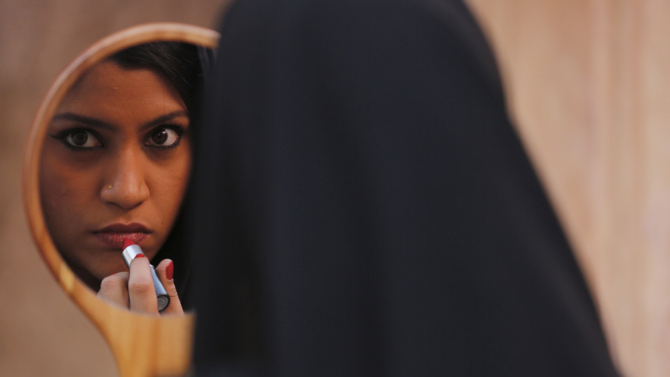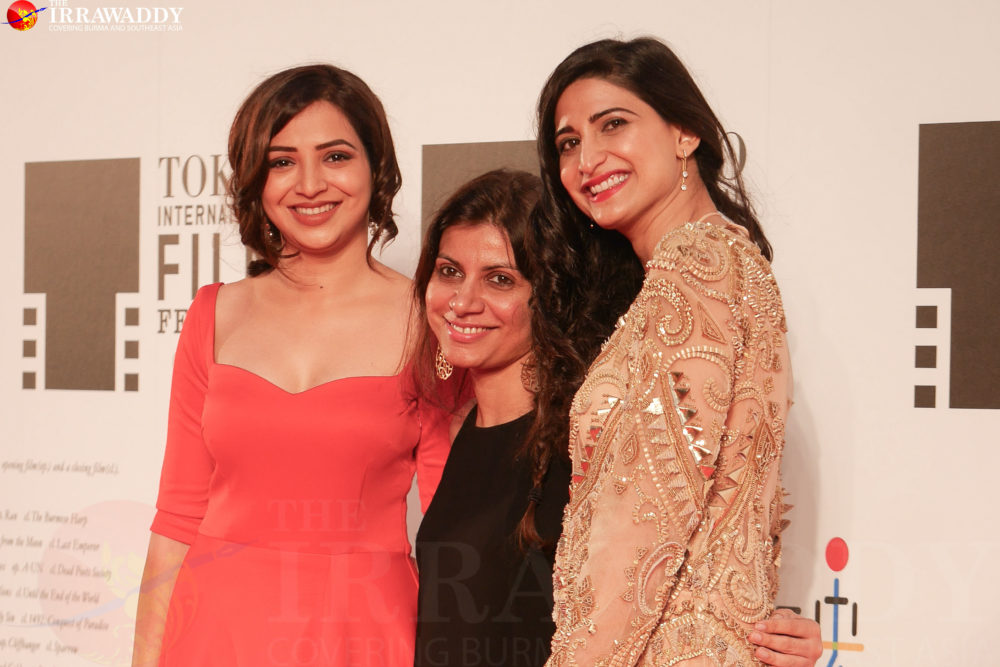Since its release in mid-October, the official trailer of the Indian film Lipstick Under My Burkha, directed by Alankrita Shrivastava, has garnered more than 1.5 million hits on YouTube. The 116-minute dramedy follows the secret lives of four women ages 18 to 55 in a small town in India, as they pursue their personal and sexual liberation from overbearing partners in a patriarchal society.
In the film, the four female characters demonstrate acts of rebellion in their own ways: a burkha-wearing college girl dreams of becoming a pop singer, a beautician in her late twenties struggles to refuse an arranged marriage, a housewife secretly works as a saleswoman, and a widow rediscovers her sexual desire.
Director Alankrita Shrivastava said at Japan’s Tokyo International Film Festival (TIFF) that it is a story with “universal resonance” despite being locally rooted.
The film had its world premiere at the 29th TIFF in October, where it won the Spirit of Asia Award. It was also screened at the Mumbai Film Festival, where it claimed the Oxfam Award for best film on gender equality. The film has yet to see its Indian release as it’s still touring the film festival circuit. The Irrawaddy sat down with the director after the Tokyo screening to discuss her inspiration and how she challenged India’s gender stereotypes and social constraints placed on women.

Where did your inspiration come from?
I grew up in a family that did not put restrictions on me. My parents never told me what I could or couldn’t do. And I came from a very educated and liberal family. Despite that, I always felt like I was not fully free inside. I kept feeling like something was holding me back from inside. That’s the struggle I wanted to explore.
I wanted to explore that feeling through characters whose lives were not like mine. If I felt it, then how much stronger must it be for people who face external restrictions? What they experience and what I experience are perhaps quite similar. There is a lot of commonality in the struggles of women. I might be experiencing struggle in the corporate sector, in the bedroom or in college. But at some level, we all deal with this conflict because we live in a patriarchal society.
As a woman filmmaker in a male-dominated industry, why do you think it’s important that films such as yours be made?
Our popular culture is conditioned to look at women through the eyes of men. Women are constantly objectified. What happens is that a woman is a hero, an object of desire or a victim. Real women are missing. The women characters dance around with the hero and are happy for being loved by a man. With all these stereotypes, you never see a real woman who has experienced heartbreak or disappointment. Women have desires and dreams like everybody else.
The tendency in India to look at a woman from a man’s point of view needs to be challenged. The representation of women and how women should relate to men is crude in our popular culture. If I, as a woman, don’t challenge this, then who will? If I don’t tell women’s stories, who will? I am nothing in the realm of our successful mainstream cinema. But I feel that there is something else I should explore and there are stories and characters that need to be told.

What is the situation like in India in terms of gender equality? Is it improving?
It improves sporadically. For instance, a few years back, a girl was gang-raped on a bus and many women went out into the streets to protest. Something changed after that and a new law was passed. But [recently], things are going back to the way they were before.
How so?
There are more women in the workforce now. But if you look at the number of women in high positions—even in the corporate sector—there is no comparison to the number of men. We’ve taken steps forward but they’re few and far between. I think mindset is the primary problem. And women play a big part in maintaining the patriarchy. Things are changing but more needs to be done.
In the film, you said that popular books and stories were misleading but that they gave us the courage to dream. Would you please talk about this?
That’s a comment on how we use popular stories, books and films. A lot of women read romantic stories and get comfort from them. At the same time, these stories are predictable and do not challenge the status quo between men and women. I wanted to show that women could benefit from popular stories or films. They could use them to find hope. It could become a tool for escape and for a little joy.
You talked about women’s choices and desires in the film. Can you talk about the kind of woman you want to become?
I made fairly unconventional choices in my life and I have been very fortunate that nobody told me not to do so. I have lived alone for many years in Mumbai and in India—that’s an unconventional choice. Rather than choosing a more conventional career, I decided to write and make films, which is unstable. I feel very fortunate that I could make these choices. There is no pressure on me to get married or to do anything else.
Not everyone has these choices. You can choose a more conventional path but the choice must be your own. Having a choice is important because freedom is being able to decide how to live your life. I wish more women would have these choices. Sometimes, women think they are making choices but they don’t realize they don’t actually have a choice. They are just being programmed to do things.
This interview was edited for clarity and brevity.

















